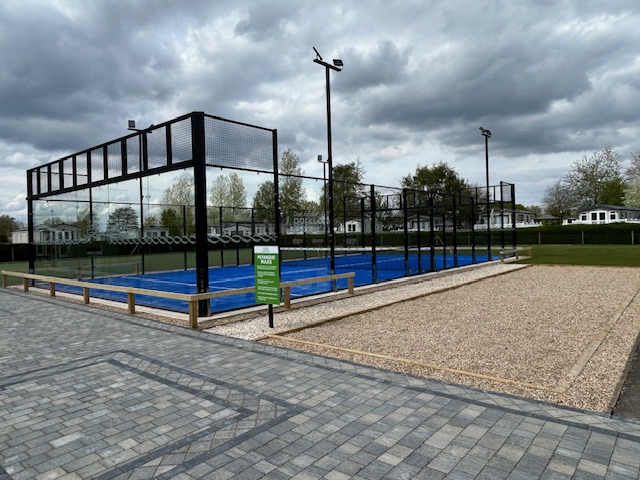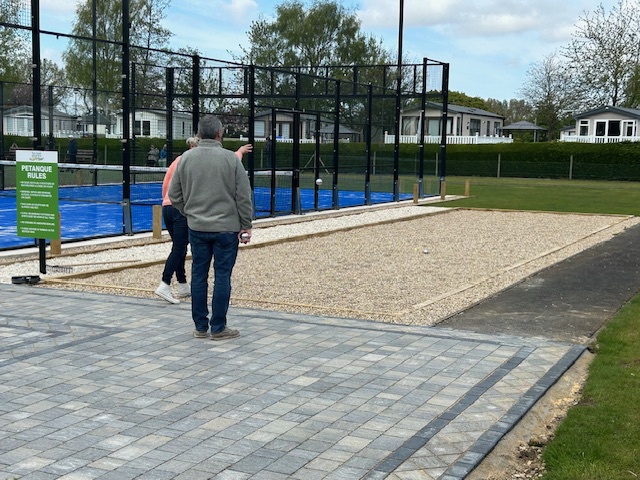
, Posted on Wednesday May 1, 2024
Padel Tennis and Pétanque at Don Amott Parks
Table of contents
4 minutes read time
New Padel Court at Nettleton!
Here at Don Amott Parks, we recently invested further in our facilities. We’re proud to now be able to offer top of the range courts for playing sports which are growing in UK popularity: Padel tennis and pétanque. Only the second padel court in Lincolnshire was recently opened at our Nettleton park, with the first at our Lakeside park. In addition, a pétanque court has also been unveiled at Nettleton.
“The padel court is a fantastic addition to the many wonderful facilities already on offer at Nettleton,” says Dave Pope, the Park Manager of Nettleton Park. “We were inspired to install as a lot of our customers go abroad and have played it, and have then told us how great it is. We’ve already had lots of delighted comments from customers pleased that Don Amott Parks has invested in another padel court so that people can join in with this fast growing sport.”
For many people the names of the sports, and how they are played, might not be familiar, so we’ll explain a little more…
What is padel tennis?
Often referred to simply as padel, this increasingly popular form of tennis is a racquet sport also containing elements of squash. It originated in Acapulco, Mexico, during the late 1960s and has rapidly spread worldwide. It is particularly popular in South America and Europe, being played by millions of people of all ages each year.
Padel is played on an enclosed court about a third the size of that used for traditional tennis, with walls made of glass or solid materials surrounding the playing area. These are integral to the game itself and add an extra strategic dimension, as players can use them to bounce the ball off.
The basic rules of padel are broadly similar to traditional tennis, with some notable differences. The ball is served underarm, and it must have bounced on the ground before the opponent can hit it back. After this initial serve the ball can be played off the walls. Scoring in padel tennis is similar to tennis, with matches typically played to a set number of points or games. However, there is a ‘no-advantage’ scoring system, meaning that if a game reaches deuce (where the players are tied 40-40), the next point wins.
Players use smaller solid paddles rather than strung tennis racquets, and the ball used in padel is also specific to the sport. Like a squash ball, it is designed to have less bounce than a standard tennis ball.
Padel tennis is a unique and exciting experience which combines strategy, skill and athleticism, and even if you are a relative amateur, it can provide a great deal of fun. It’s an engaging way to stay active and socialise while you’re at the Don Amott parks in Nettleton and Lakeside.
What is Pétanque?

Far more sedate than padel tennis, pétanque is a leisurely yet strategic ball game which originated in the region of Provence, France, in the early 20th Century. It’s extremely popular in France, where it’s traditional for players to gather and compete on public courts as a social activity as well as a sporting one.
Pétanque can be played informally on any flat outdoor surface, but it’s best enjoyed on hard-packed dirt or gravel courts. The basic rules are straightforward, which makes the game accessible to players of all ages and skill levels.
Each player or team is given a set of hollow metal balls (also known as boules), typically consisting of three or four per player. The game begins with a player tossing the wooden cochonnet (or, in the UK, the jack) to a distance between 20 and 30 feet away, with players then taking turns to throw their boules with the aim of getting them as close to the jack as possible, as well as disrupting their opponents’ boules or obstructing them. In other words, players may aim to knock opponents’ boules away from the jack or use their own boules to create barriers, making it more difficult for opponents to get close to the target. Unlike similar games, in pétanque the players remain stationary with both feet remaining on the ground when throwing their boules.
Special equipment required for pétanque includes the wooden cochonnet and the boules themselves (typically made of metal and available in various weights and sizes). Additionally, players may feel the need to carry a small measuring tape so that they can determine which boule is nearest to the jack if there are any close calls!
Pétanque’s sheer simplicity, relatively steady pace and emphasis on camaraderie make it a timeless favourite amongst the many players worldwide. Here at Don Amott’s Nettleton park, in fact right next to the padel tennis court, is a fantastic pétanque court – and just the same as all facilities, it’s free to use for customer use only.
With so many wonderful leisure facilities already available at the Nettleton and Lakeside Don Amott Parks, the addition of the padel and pétanque courts means you can really raise your game!


